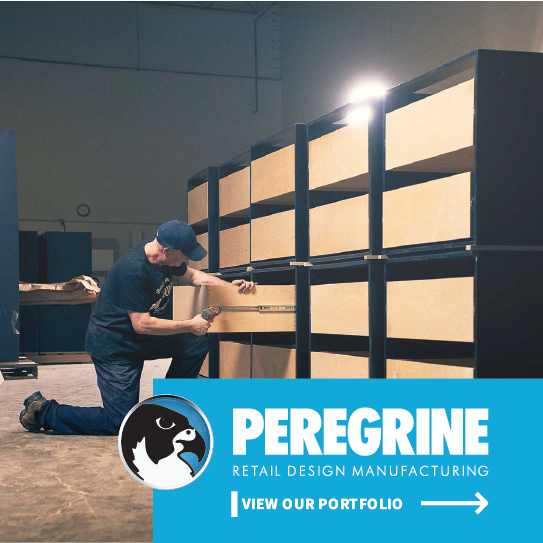Sustainable Japanese Lifestyle Brand ‘Puebco’ Enters Canada with Hybrid Ecomm and Brick & Mortar Strategy
/Outside the new Stackt Market storefront. Photo credit: Nick Lee @BestofToronto
By Craig Patterson
Japanese sustainable lifestyle brand Puebco has entered the Canadian market with its first physical storefront as well as with a new Canadian e-commerce website. The brand’s strategy involves opening pop-up spaces as well as examining wholesale opportunities with a goal of engaging with consumers and building brand awareness, while at the same time driving traffic online. Puebco could also eventually open permanent physical spaces in Canada if the market embraces the concept.
Puebco was founded by Tokyo-based designer Hirotaka Tanaka in 2007 with a goal of creating a range of products made from recycled materials, as well as unique objects that have been found and in some instances repurposed. What has resulted is a range of Puebco lifestyle products that are inspired by a retro industrial style integrated with a Japanese minimalist aesthetic.
The brand’s product offerings include home goods, travel accessories, bags, apparel, pet goods and other lifestyle categories that cater to a consumer seeking-out sustainable products with a uniquely rugged design. Mr. Tanaka spends much of the year traveling across Asia and beyond in search of materials that can be repurposed for goods sold by Puebco. A line of pet beds, for example, are made from repurposed camping tents, with each being unique given the limited availability of materials used. Prices are reasonable considering the look and materials used — most items cost less than $60, with some items costing up to $260 for items such as a ‘nomadic bed’, and 5-litre beverage dispenser. Some of Puebco’s products are already popular with restaurants seeking unique vintage-looking fixtures and serving items, with prices being reasonable compared to other retailers carrying similar looking products.
Inside the Stackt storefront in Toronto. Photo credit: Nick Lee @BestofToronto
Inside the Stackt storefront in Toronto. Photo credit: Nick Lee @BestofToronto
PHOTO: PUEBCO VIA FACEBOOK
PHOTO: PUEBCO VIA FACEBOOK
Puebco’s first Canadian retail space opened this week at the Stackt Market in Toronto. In April of this year, Retail Insider featured the unique multi-tenant shipping container market located at Front Street West and Bathurst Street, which is the largest of its kind in Canada. The Puebco pop-up space, which occupies two shipping containers in about 600 square feet, will be open to the public until October.
The goal of the Toronto pop-up is to drive awareness to the Puebco brand as it makes its Canadian debut. Consumers can interact with the brand and touch and feel the product in a dedicated environment. Being able to purchase goods and bring them home satisfies the desire for immediacy, and the experience of the physical store is an experience that cannot be replicated online, even with technological innovations such as virtual reality.
At the same time, the pop-up space’s goal is to also drive traffic to Puebco’s newly launched Canadian e-commerce site. The website offers a range of goods from Puebco and given the nature of the product being recycled and found, some products are expected to sell-out quickly. Opening a physical retail space to drive traffic to Puebco’s e-commerce site is an intelligent move supported by research. For example, the International Council of Shopping Centres (ICSC) put out a study late last year discussing the “halo effect” where having a physical space in a market can result in an increase in online traffic as much as 37% in the same market.
PHOTO: PUEBCO VIA FACEBOOK
PHOTO: PUEBCO
PHOTO: MARU8-FUK.JP
Puebco’s pop-up strategy is expected to be expanded into other markets in Canada in an effort to further create brand awareness of the Puebco brand. The Montreal market could be a target for a temporary storefront, and the Vancouver/Lower Mainland market might make sense given its eco-conscious demographic as well as its large Asian population. Finding the ‘right’ location for a pop-up will be critical — a brand such as Puebco is less likely to resonate with a store in a traditional shopping centre, for example. Stackt market, which includes a mix of purpose-built and recycled shipping containers, makes sense for Puebco with its unique layout and overall aesthetic.
A Canadian wholesale strategy is also being strategized, where Puebco may provide a range of goods within a host retailer to further offer consumers the opportunity to interact with the brand, while also creating brand awareness while driving traffic to Puebco’s e-commerce website. Non-traditional retail locations could be utilized for small shop-in-shops — for example if an antique store had space, it could showcase a range of Puebco goods. Lifestyle retailers could be another target if partnerships can be negotiated, and Puebco even noted that a ‘food environment’ could lend itself to a brand activation.
Puebco’s entry strategy into the United States market, which is being led by a different team than in Canada, involves wholesale partnerships to allow for physical interaction with the brand’s products while also creating brand awareness in an effort to drive traffic to Puebco’s dedicated US e-commerce site. As of yet, Puebco has not announced a standalone retail space in the US as it has done in Toronto.
PHOTO: PUEBCO
PHOTO: PARK-MAG.JP
At some point, there is a possibility that Puebco could look to open permanent retail spaces in Canada as brand awareness grows. At the same time, the Puebco business model using salvaged materials and found items means that growth will be methodical and in line with product availability. Mr. Tanaka clearly has a passion for what he does (often traveling by motorcycle) and does much of Puebco’s sourcing himself, and in the future may be able to scale the business model further as demand grows globally.
Large Canadian cities containing unique/cool areas could be in line for Puebco stores, if it comes to that. In Toronto, a place like Kensington Market or Chinatown might make sense, or even hip West Queen West which several years ago Vogue Magazine ranked as the world’s ‘second-coolest neighbourhood’. Montreal and Vancouver also have unique and up-and-coming areas that could be targets for Puebco if it decides to expand with its own direct-to-consumer standalone retail strategy.
Puebco operates a store near its headquarters in Tokyo, with a second one to come in the city’s Shibuya area. According to Puebco’s corporate website, the brand has partnered with several unique multi-brand retailers to open rugged-looking Puebco shop-in-stores, which are characterized by antique-looking wooden fixtures displaying a range of Puebco products. Canvas bags made from recycled materials stand out in the spaces, as do various home goods in materials such as metal. “Authentic” might be a word used to describe the look of the shop-in-stores and products, which is a deviation from the modern look of many retail spaces seen in Canada and globally today.
PHOTO: PUEBCO VIA FACEBOOK
PHOTO: PUEBCO VIA FACEBOOK
PHOTO: img-cdn.jg.jugem.jp
Puebco is the latest Japanese brand to enter the Canadian market. Uniqlo and Muji are two well-known examples, with both retailers planning on opening units in markets across the country. Puebco’s value proposition, which includes repurposed/recycled and found items, is considerably different from Uniqlo and Muji which, for the most part, are selling goods manufactured specifically for the brands. Puebco’s growth in the Canadian market will also be less aggressive than that of Uniqlo and Muji in Canada — Uniqlo said at one time that it was looking at opening approximately 100 stores across Canada in the coming years, while Muji could open as many as 25 units with a strategy that could expand beyond traditional retail.
As consumers become increasingly aware of how fashion brands’ manufacturing and dying processes can be a significant cause of pollution, eco-friendly brands such as Puebco are increasingly grabbing the attention of Canadians looking to minimize their impact on the environment. Zero-waste grocery and other retailers are expanding further into the market. When Retail Insider reported on Toronto-based bare market’s plans to open its first permanent retail space, it became one of the most-read articles on the website for 2019. Other retailers are jumping on the bandwagon and even landlords such as Oxford Properties are doing things such as eliminating plastic straws from shopping centres in an endeavour to be more environmentally friendly.
Clothing rentals is also a trend that is growing quickly in Canada, with established players as well as upstarts offering clothing and accessories via subscription models or item-by-item rental. Clothing rental is predicted to become big business in Canada in an age where ‘influencers’ and social media results in some not wanting to be photographed twice in the same outfit. Rented formalwear, including evening gowns, are also becoming increasingly popular as shoppers seek out savings by renting an outfit for an evening rather than making a permanent and larger investment.
International brands continue to enter Canada at a rapid pace in an effort to gain market share. At the same time, homegrown brands are having to innovate to survive, or risk losing out. While Canada is seen as an attractive market with a population willing to spend, the country is also smaller than California both in population as well as in GDP. What that means is there is only so much of the retail ‘pie’ to go around, and competition will continue to intensify as more brands enter Canada in the coming years.
Now located in Toronto, Craig is a retail analyst and consultant at the Retail Council of Canada. He's also the Director of Applied Research at the University of Alberta School of Retailing in Edmonton. He has studied the Canadian retail landscape for the past 25 years and he holds Bachelor of Commerce and Bachelor of Laws Degrees. He is also President & CEO of Vancouver-based Retail Insider Media Ltd. Email Craig: craig@retail-insider.com























![Retail-insider-NRIG-banner-300-x-300-V01-3[2].jpg](https://images.squarespace-cdn.com/content/v1/529fc0c0e4b088b079c3fb6d/1593476525034-QRWBY8JUPUYFUKJD2X9Z/Retail-insider-NRIG-banner-300-x-300-V01-3%5B2%5D.jpg)
![Retail-insider-NRIG-banner-300-x-300-V01-2[2].jpg](https://images.squarespace-cdn.com/content/v1/529fc0c0e4b088b079c3fb6d/1593476491497-W6OZKVGCJATXESC9EZ0O/Retail-insider-NRIG-banner-300-x-300-V01-2%5B2%5D.jpg)
![Retail-insider-NRIG-banner-300-x-300-V01-4[2].jpg](https://images.squarespace-cdn.com/content/v1/529fc0c0e4b088b079c3fb6d/1593476508900-TJG5SNQ294YNOCK6X8OW/Retail-insider-NRIG-banner-300-x-300-V01-4%5B2%5D.jpg)